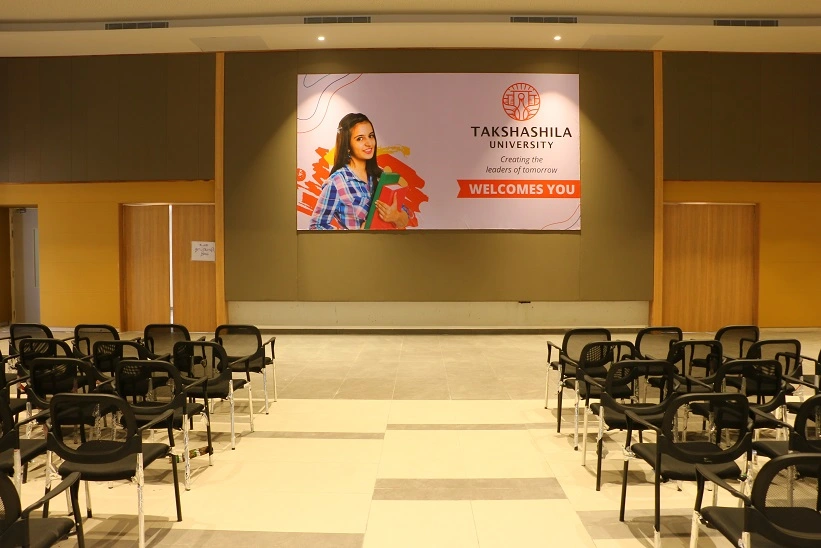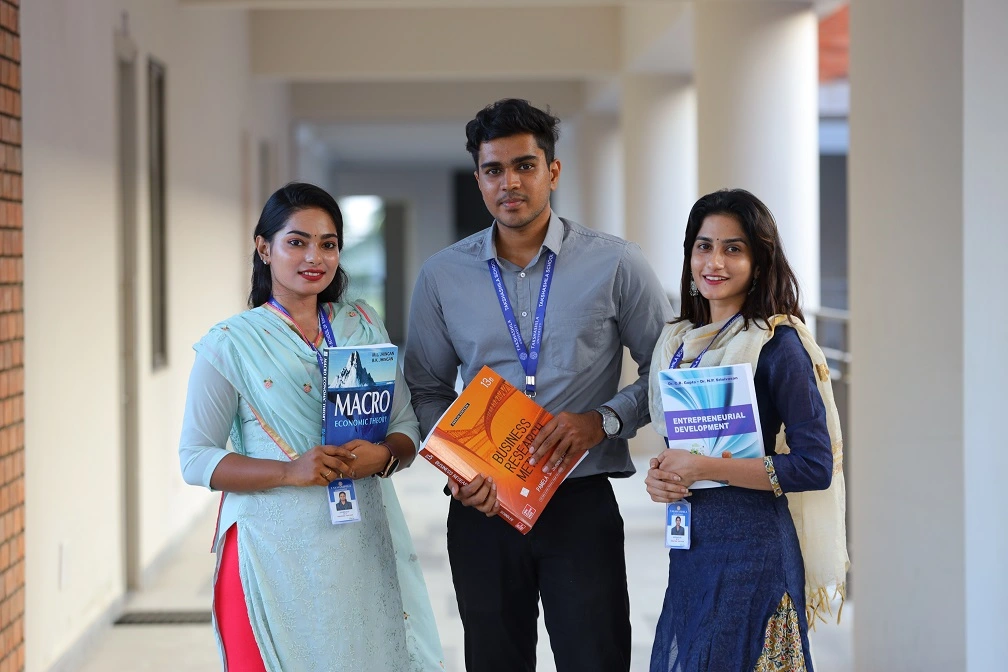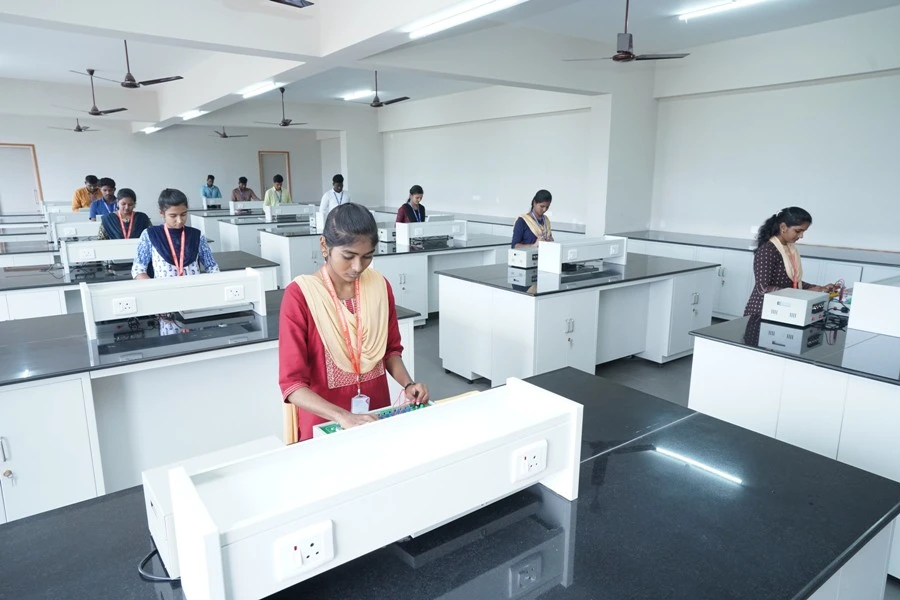Ph.D. Computer Science
- Hands-on Training
- Faculty with International Experience
- Advanced Curriculum
- Upto 100% Scholarship based on merit

About the Course
The Ph.D. in Computer Science at Takshashila University is designed to foster advanced research and innovation in the field of computing. This rigorous programme equips scholars with the knowledge and skills necessary to explore complex problems in areas such as artificial intelligence, data science, cybersecurity, machine learning, software engineering, and more.
Throughout the course, scholars engage in high-level academic inquiry, develop original research, and contribute to the evolving landscape of computer science. With a strong emphasis on both theoretical foundations and practical applications, this programme prepares students for academic, industrial, and governmental research roles that demand deep analytical and technical expertise.
Course Curriculum

Year 1
The first year focuses on building a strong research foundation and enhancing your understanding of advanced computer science concepts. You will be introduced to research methodologies, recent trends, and core computational theories. This phase prepares you to identify research gaps and formulate research questions.
Key Subjects: Research Methodology in Computer Science, Advanced Algorithms, Recent Trends in Computer Science, Computational Theory, and Academic Writing.
Year 2
In the second year, the focus shifts to comprehensive literature reviews, proposal development, and coursework aligned with your chosen research area. You will also begin working closely with your guide to refine your research proposal and methodology.
Key Subjects: Research Area-Specific Electives (e.g., AI, Data Science, Cybersecurity), Literature Review and Gap Analysis, Research Proposal Development, Advanced Programming Techniques, and Domain-Specific Tools.
Year 3 and Beyond
During the final phase, you will concentrate entirely on your research project, collecting data, analysing results, and drafting your thesis. Regular presentations and progress reviews will help you stay on track, leading up to the submission and defence of your dissertation.
Key Subjects: Thesis Work, Research Publication, Data Analysis and Interpretation, Viva Voce Preparation, and Dissertation Defence.
Programme Outcomes (POEs)
Upon completing the Ph.D. in Computer Science, you will have developed the following academic and professional competencies:
Advanced Research Competency
You will be able to conduct independent, original research that contributes to the body of knowledge in computer science. This includes formulating research questions, applying appropriate methodologies, and interpreting complex data with precision.
Expertise in Core and Emerging Areas
You will demonstrate in-depth knowledge of both foundational subjects and emerging technologies such as Artificial Intelligence, Machine Learning, Cybersecurity, and Big Data Analytics, enabling you to innovate in your chosen field.
Scholarly Communication
You will gain the ability to present your research clearly and effectively through academic writing, publications in peer-reviewed journals, and presentations at national and international conferences.
Problem-Solving and Analytical Skills
You will develop strong analytical skills to tackle real-world computational problems. This includes designing, modelling, and evaluating systems and solutions for practical and theoretical challenges.
Ethical and Responsible Research Practice
You will be trained in ethical research standards, ensuring that your work upholds integrity, transparency, and social responsibility in both academic and professional contexts.
Leadership and Academic Contribution
You will be prepared to take up leadership roles in academia, research institutions, or industry, guiding teams, mentoring students, and contributing meaningfully to the advancement of computer science education and research.
Programme Outcomes (POs)
The Ph.D. in Computer Science will help you achieve the following broader learning outcomes:
PO1: Mastery of Core and Advanced Concepts
You will attain a deep and critical understanding of fundamental and advanced topics in computer science, enabling you to contribute new insights and theories to the field.
PO2: Research and Analytical Expertise
You will develop the skills to design and conduct high-quality, original research. This includes identifying research gaps, formulating hypotheses, applying advanced methodologies, and analysing complex data.
PO3: Innovation and Problem-Solving
You will acquire the ability to address real-world computational challenges by designing innovative solutions, algorithms, and models that are efficient, scalable, and impactful.
PO4: Scholarly Communication and Collaboration
You will enhance your ability to communicate research outcomes effectively through academic writing, publishing in reputed journals, and presenting at national and international forums. Collaboration with interdisciplinary teams will also be a key strength.
PO5: Ethical and Responsible Research Conduct
You will learn to uphold the highest standards of ethics and integrity in research, ensuring responsible use of data, technology, and intellectual property.
PO6: Academic and Industry Leadership
You will be prepared to take on leadership roles in academia, research labs, and tech-driven industries, guiding future research, mentoring scholars, and influencing technological advancement through informed decision-making.
Programme Specific Outcomes (PSOs)
The Programme Specific Outcomes focus on the research-driven and industry-relevant skills you will gain through the Ph.D. in Computer Science, allowing you to excel in specialised areas within the field.
PSO1: Advanced Computational Problem Solving
You will develop the ability to design, analyse, and implement complex algorithms and computational models to solve advanced problems across domains such as artificial intelligence, cybersecurity, and data science.
PSO2: Specialisation in Emerging Technologies
You will gain expertise in cutting-edge areas like machine learning, blockchain, quantum computing, and cloud infrastructure, positioning you at the forefront of technological innovation and research.
PSO3: Independent Research and Thesis Development
You will be equipped to independently conduct high-impact research, formulate research questions, and produce a well-structured doctoral thesis that contributes original knowledge to the discipline.
PSO4: Data-Driven Decision Making
You will learn to interpret and manipulate large-scale datasets using statistical tools, data mining techniques, and machine learning frameworks to support data-driven research and innovation.
PSO5: Development of Software and Systems
You will acquire the skills to conceptualise, design, and optimise software systems and applications, aligning academic knowledge with real-world technological needs and user requirements.
PSO6: Academic and Industry Readiness
You will be prepared for academic careers and leadership roles in R&D organisations, equipped with strong technical writing, teaching, and collaborative skills essential for mentoring and team-based innovation.
Career Scope
Upon completion of the Ph.D. in Computer Science, you will be well-equipped to pursue advanced research, academic, and leadership roles within the technology and research sectors. The field offers a broad range of career opportunities both in India and globally, spanning academia, industry R&D, government agencies, and tech enterprises. Here are some of the potential roles you can pursue:
University Professor / Academic Researcher
- Role: Teaching undergraduate and postgraduate students, guiding research scholars, publishing scholarly work, and contributing to curriculum development in universities and research institutions.
- Salary: ₹8,00,000 to ₹18,00,000 per annum (depending on the institution and experience).
Data Scientist / Research Scientist
- Role: Conducting advanced research in data analysis, machine learning, or artificial intelligence, developing predictive models, and translating data into actionable insights.
- Salary: ₹10,00,000 to ₹25,00,000 per annum.
Machine Learning Engineer
- Role: Designing and implementing machine learning algorithms and systems, training models, and optimising performance for applications such as natural language processing or computer vision.
- Salary: ₹8,00,000 to ₹20,00,000 per annum.
Computer Scientist (R&D Labs / Tech Companies)
- Role: Engaging in cutting-edge research and innovation, building new computational theories, tools, or products in areas like cybersecurity, distributed systems, or quantum computing.
- Salary: ₹12,00,000 to ₹28,00,000 per annum.
AI Researcher
- Role: Conducting in-depth research in artificial intelligence, including neural networks, deep learning, and autonomous systems, often contributing to patents and whitepapers.
- Salary: ₹10,00,000 to ₹22,00,000 per annum.
Postdoctoral Research Fellow
- Role: Undertaking specialised research under senior scientists or principal investigators at universities or research institutions, contributing to funded projects or independent research.
- Salary: ₹6,00,000 to ₹12,00,000 per annum.
Software Architect
- Role: Leading the design of complex software systems, setting technology standards, and ensuring scalable, secure, and high-performance architecture.
- Salary: ₹15,00,000 to ₹30,00,000 per annum.
Cybersecurity Expert / Cryptographer
- Role: Designing secure systems, developing cryptographic algorithms, and ensuring data protection in high-stakes environments such as finance, defence, and healthcare.
- Salary: ₹9,00,000 to ₹20,00,000 per annum.
Blockchain Developer / Researcher
- Role: Creating and optimising decentralised applications, smart contracts, and blockchain protocols, while contributing to innovative applications across sectors.
- Salary: ₹8,00,000 to ₹18,00,000 per annum.
Tech Policy Analyst / Government Research Officer
- Role: Advising on the development and regulation of emerging technologies, participating in national technology missions, and conducting public-interest technology research.
- Salary: ₹7,00,000 to ₹15,00,000 per annum.
The field of Computer Science offers vast and dynamic career potential, with continuous growth driven by technological advancement and global digital transformation.
What You Will Gain at Takshashila University

At the School of Computer Science, Takshashila University offers a world-class Ph.D. programme designed to prepare you for academic excellence, research innovation, and leadership in the tech industry. Here’s how we empower you to excel:
Rigorous Research-Focused Curriculum
The Ph.D. curriculum at Takshashila University is built to foster advanced research and analytical thinking. You will gain in-depth expertise in core areas of computer science while engaging with emerging technologies and real-world challenges.
Dedicated Faculty Mentorship
With access to experienced faculty members actively involved in research, you will receive personalised guidance and mentorship throughout your doctoral journey. This ensures your academic and research goals are fully supported and nurtured.
Access to Advanced Research Facilities
You will benefit from well-equipped laboratories, high-performance computing resources, and specialised research centres. These facilities provide a strong foundation for conducting impactful research across diverse areas in computer science.
Opportunities for Interdisciplinary Collaboration
Takshashila University encourages interdisciplinary research, allowing you to collaborate with experts from other fields such as data science, artificial intelligence, engineering, and life sciences to create innovative solutions.
Industry and Academic Networking
Through conferences, seminars, guest lectures, and industry partnerships, you will build strong connections with academicians, researchers, and technology leaders. These networks will be instrumental in advancing your career in research or industry.
Global Outlook with Regional Insight
While gaining a global perspective on research trends and technological advancements, you will also explore region-specific applications and challenges. This balanced approach ensures your research remains relevant and impactful across various contexts.
Pursuing a Ph.D. in Computer Science at Takshashila University will equip you with the knowledge, experience, and connections needed to lead and innovate in academia, research, and industry.

To apply for the Ph.D. in Computer Science, candidates must meet the following criteria:
- Academic Qualification: Candidates must have completed a Master’s degree (M.Sc./M.Tech/MCA or equivalent) in Computer Science or a related field from a recognised university.
- Minimum Marks: A minimum of 55% marks or equivalent CGPA in the qualifying examination is required.
- Entrance Exam/Interview: Candidates may be required to qualify in a university-conducted entrance examination and/or attend a personal interview to assess research aptitude and subject knowledge.
Please check the specific details for the current admissions cycle on the Admissions Page.

For All Programmes except MBA, MCA, M.Tech, and Integrated Programmes offered by Sunstone, FacePrep, Kalvium and NxtWave
|
S.No |
% of Marks |
Scholarship Amount in Tuition Fees per year |
|
1 |
60% – 75% |
10% |
|
2 |
Above 75 % – 90 % |
25 % |
|
3 |
Above 90 % |
50 % |
Calculation of percentage of Marks (+2 of HSC / 2nd Year of APBIM or +2 of CBSE or Equivalent)
- Engineering – Average marks in Mathematics, Physics, Chemistry/Computer Science
- Lateral Entry – Average marks in Diploma Programme.
- Agriculture – Average marks in Physics, Chemistry, Biology / Botany &Zoology
- AHS / BPT / Pharmacy – Average marks in Physics, Chemistry, Biology / Botany &Zoology/Bio Tech
- UG – Arts & Science / Hotel Management – Overall +2 marks – (+2 of HSC / 2nd Year of APBIM or +2 of CBSE or Equivalent)
- PG – Overall % in UG
- Diploma – Average mark in 10th /Equivalent
MBA, MCA, M. Tech, and Integrated Programmes offered by Sunstone, FacePrep, Kalvium and NxtWave – No Academic Scholarship applicable.
Experience Beyond the Classroom at Takshashila University
At Takshashila University, your Ph.D. journey goes far beyond research and academics. The university provides a dynamic and enriching environment that supports your intellectual growth while also encouraging personal and professional development through real-world exposure and community engagement.
What you can look forward to

Research-Driven Environment
Collaborate on interdisciplinary projects, attend research seminars, and engage in conferences that broaden your perspective and sharpen your expertise in computer science.

Advanced Facilities
Access modern research labs, computing centres, and digital libraries equipped with the latest tools and technologies to support your innovation and inquiry.

Professional Networking
Connect with leading academicians, industry professionals, and fellow researchers through symposiums, guest lectures, and collaborative projects.

Vibrant Doctoral Community
Participate in academic forums, student-led research groups, and campus initiatives that foster leadership, critical thinking, and a sense of belonging.
Spread over 150 acres
At Takshashila University, you will have ample opportunities to hone your skills in real-world healthcare settings, utilising state-of-the-art medical facilities and simulation labs on our 150-acre campus.
Ready to take the next step in advancing your expertise in Computer Science?
Frequently Asked Questions (FAQs)
What is the duration of the Ph.D. in Computer Science?
The Ph.D. programme typically takes 3 to 5 years to complete, depending on the nature of the research and the progress made by the scholar.
Do I need a background in Computer Science to apply?
Yes, candidates must hold a Master’s degree in Computer Science or a related field from a recognised university.
What kind of research support is available?
Takshashila University provides access to expert faculty, advanced research labs, and resources to support innovative research in various areas of Computer Science.
What is the eligibility criteria for the Ph.D. in Computer Science?
Applicants must have a relevant postgraduate degree with at least 55% marks and may be required to clear an entrance exam or interview as part of the selection process.









